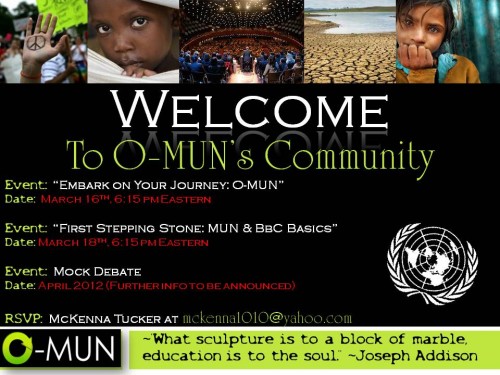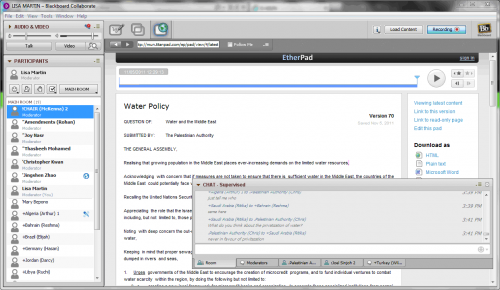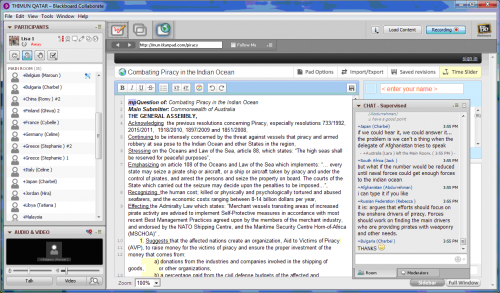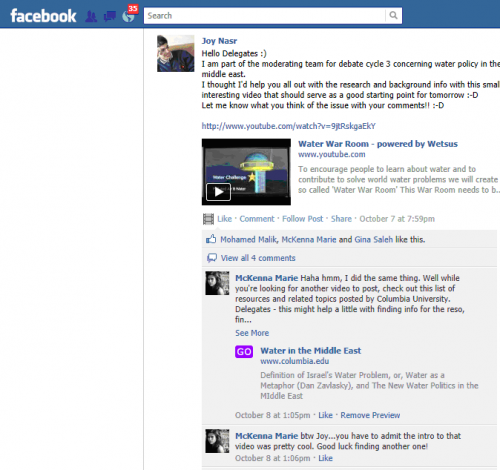O-MUN launched in Fall 2011 and is currently the world’s only online debating platform for high school students. The program includes monthly global debates, weekly regional debates, and outreach to parts of the developing world to expand the scope of the Model UN community. More information on O-MUN’s online debates can be found at:
- The O-MUN website
- The O-MUN blog
- A recording of the most recent debate, featuring Best Delegate’s very own Ryan Villanueva as keynote speaker
Click the button below to learn more about O-MUN from three unique perspectives: an experienced THIMUN delegate, a student from an online high school, and one whose school has no MUN program.

McKenna Tucker describes how O-MUN works
McKenna Tucker is a junior at George Washington University Online High School and an Assistant Director at O-MUN (the only high school student to hold this position). Here she talks about how O-MUN works and reflects on our community.
Delegates and partakers of Online Model United Nations (O-MUN) don’t live in the same town, city, or even nation. O-MUN’s delegates and moderator team are literally spread across the globe, natives of both developed and developing nations alike and epitomizing a beautiful concoction of countries, cultures, backgrounds, nationalities, religions, and languages.
Thanks to the groundbreaking advantages of today’s technology, O-MUN is not subjected to the confines of a building or a conference room. Instead, O-MUN is cultivating a thriving community of students and delegates across the world who, without ever having to leave the comfort of their homes, are able to come together online to create, decipher, and debate resolutions on pressing international issues confronting our world and our fellow global citizens.
How does this work?
Via our official O-MUN Delegate Group on Facebook, delegates connect on a continuous basis to help each other to grow, learn, and develop. During debate cycles, delegates and moderators introduce themselves and transcend their personal or cultural differencess to fortify international friendships and reinforce collaborative efforts, post helpful resources on the debate topic (YouTube videos, articles, speeches, presentations, and statistics, for example), converse in real-time via Facebook’s chatbox feature during or in-between sessions, and stay updated on upcoming O-MUN events and opportunities.
Each month, delegates are then able to connect live via the O-MUN Blackboard Collaborate (BbC) room. Using this web-based technology delegates attend various lobby sessions (and other events such as “Welcome Orientations” that help walk them into our community, annual “Kick-Off Celebrations” that launch the new semesters and year ahead, and “Test Your Techs” to learn more about how they can use aspects of the technology building the backbone of O-MUN, etc.) to work together in real-time to craft and revise resolutions that will be scrutinized and further amended at upcoming debates.
To make these gatherings and our live monthly debates a success, delegates speak with each other on microphones in our Bb room, write and type on what we call the “whiteboard” just as they would a blackboard in a physical classroom, and even turn on their web cams to work and collaborate face-to-face. This technology is the foundation of O-MUN, allowing us to break the boundaries of traditional MUN settings and to connect with youth around the world.

Chris Bishop describes how O-MUN gives him the opportunity to participate in Model UN
Chris Bishop from Caterham, England talks about what it means to be part of a global and growing online community coming from a school that has no MUN program.
When I was introduced to MUN as a concept at the end of last year by a friend, I was eager to give it a try. Being an active debater, I had a hunch that I would really enjoy MUN, but was very disappointed when I discovered that my school had no MUN program. After searching around, I came across O-MUN. It was easy, accessible, and most importantly, there were no restrictions on entry. I immediately signed up, and threw myself in the deep end by deciding to try being a delegate. My first MUN experience was online. It was a steep learning curve, but the experience of the moderators, who have attended a huge number of conferences between them, helped me quickly grasp the whole idea of MUN, and understand the rules and procedures behind a debate. O-MUN is quick and easy to grasp, and is great as an entry level into MUN if you have no prior MUN experience. You can also hone your skills with online debating. O-MUN covers all the basics of MUN, and also provides people without a MUN program in their school an opportunity to attempt this wonderful form of debate and discussion. It provides a whole new way to tap into the vast base of potential delegates out there all across the world.
One of the most unique aspects of O-MUN is its growing online community, and the sense of unity and cooperation between all of those involved in this amazing project. The premise behind O-MUN encourages great cooperation, outside of debate times. This really bonds us as a community, and the distinction between staff and delegates is blurred, but in a good way. Staff members regularly step into the shoes of delegates, and delegates are given plenty of opportunities to try their hand behind the scenes. O-MUN is different, dynamic and diverse, bringing together like-minded, driven people from all across the world, creating a friendly, active environment to be introduced and to practice MUN skills. It’s incredibly exciting to be part of such a rapidly advancing project, and by signing up, you could make history by being part of the first online MUN this world has seen.
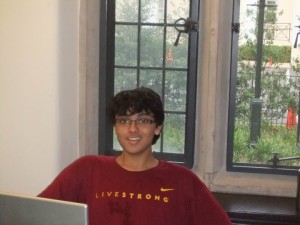
Rohan Desai describes how O-MUN compares to Model UN conferences
Lastly, Rohan Desai, a junior at Singapore American School, encourages us to think beyond the endearing qualities and trappings of a traditional MUN conference, to look at a bigger vision of how technology, married to a traditional Model UN program, can be a transformative experience for students with little to no options for global debate with their peers. Rohan has participated in MUN programs since middle school and has attended numerous international conferences.
To the newcomer, MUN can be daunting. Resolutions, decorum, points of information, and points of privileges are but the formalities involved in the complex world of international politics and conflict resolution. However to me, the timid delegate of Costa Rica, the courtliness of MUN procedures were just as complex and intimidating as the seemingly impossible issues we were set out to solve. There was a factor of cool involved in all of this. The fact that I, a timid middle schooler, was dressed up in business attire and advocating for the needs of something as important as a nation was both engaging and what ultimately resonated with me. Simply put, I liked feeling important, and I liked arguing, and MUN was the medium to do such a thing. Out of this enjoyment grew a personal interest in both domestic and international politics, policy and relations, and I owe MUN for the personal development and drive that has resulted.
The flipside to these positive experiences was that whenever a conference was over and the thrill of the debate had receded, I was left with a sense of emptiness. I knew there had to be a way to change this. Through a fortunate set of circumstances, I stumbled onto the O-MUN moderating and development team and found my answer. Truly an exemplar of the power of an Internet connection, O-MUN has exacted change in the lives of many peers, literally across the world. While most conferences are international only in principal, O-MUN is international in the literalist of senses. A Lebanese student may be the delegate of France while a Singaporean may be the delegate of Chile, and such diversity is nearly unheard of at physical, confined MUN conferences, contributing to a personal enhancement of knowledge and understanding of nations, religions and cultures on a completely different level. From the first Somali delegate from a border town in that nation, to a group of high school students in Ghana, from prep schools in the UK, to homeschoolers in the USA, O-MUN is the 21st century manifestation of open education and engagement for all, and the democratizing potential that technology can create. Online debate’s growth, passionate user base, indeed its very existence, is testament to the power of Model United Nations.
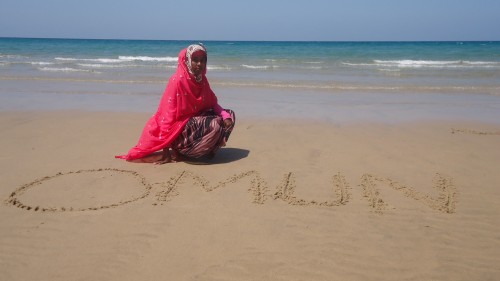
This student is from Somalia and she's able to do Model UN because of O-MUN
A special thank you to Lisa Martin, co-founder and co-director of O-MUN, for helping me learn more about the project and for coordinating this post!
What do you think of Online Model United Nations? Leave a comment below!

